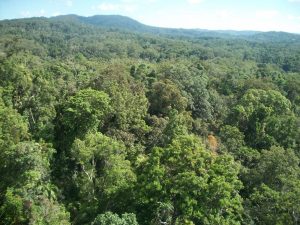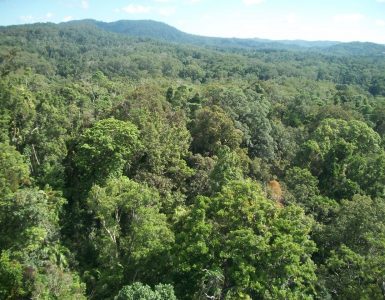On 25 March 1974, in a small village in India, a group of local women hugged trees and even put their lives on the line to ensure the trees and forests were secure.
Reason: They were protecting the trees from armed loggers who were contracted to cut down trees in the forest.
This date and incident is locally known as the Chipko Andolan or the tree-hugging movement and is considered a watershed moment in the history of India’s ecological activism. The event highlights the importance of forests in the lives of native people. They understand this not only because they depend on the forests for food and fuel, but they also know the significance of forests for activities like water purification, and soil stabilization, among other benefits.
However, the same respect is sometimes ignored or forgotten by modern societies. This is evident in the level of deforestation that is reaching massive proportions across the globe. Huge tracts of land are being cleared for agriculture, mining, industries, and household needs.
As per the Food and Agriculture Organisation (FAO) of the United Nations, since 1990 we have lost over 420 million hectares of forest worldwide and between 2015 and 2020, the rate of deforestation was estimated at 10 million hectares per year. The loss of forests is not only threatening humanity but is also posing risks to our biodiversity and endangering our animal world. Many animals are on the verge of extinction due to forest loss.
Each one of us has utilized the benefits that our forests provide. Therefore it is extremely significant that we reiterate the reasons why forests are important and appreciate their beauty and necessity. Let us look at some of the key functions of forests.


Generates Oxygen
Forests enable the generation of oxygen which is essential for human survival. The leaves of the trees release oxygen during the process that is called photosynthesis.
Carbon Sink
The trees in the forests are important for fighting climate change as they absorb large amounts of the greenhouse gases like carbon-di-oxide, carbon monoxide, sulfur dioxide, and nitrogen dioxide. The forests store these gases for hundreds of years and keep our air clean.
A study published in the Science journal found that by planting more than a half trillion trees, the planet could capture about 205 gigatons of carbon and reduce atmospheric carbon by about 25 percent.
Gives Food
From apples to mangoes, from cashew to almonds, trees in the forests give a variety of food options and play a critical role in supplying essential nutrients to our bodies.
Act as aquifers
Forests act like giant sponges and play a critical role in many water management activities, like providing us with clean drinking water, improving the water table, filtration of water pollutants, control of floods, and regulating stormwater. The same water is required for our day-to-day needs like drinking, bathing, and other household purposes.
The Amazon rainforest provides the world’s largest watershed and river system.
Regulate weather and rainfall
The importance of forests is also evident in regulating our climate as trees recycle moisture in the atmosphere through the process of transpiration to increase rainfall. In an IPCC report, it was mentionedthat enhanced forest cover increases evapotranspiration which results in cooler days, and reduces the magnitude of heat-related events.
Provides Jobs
Industries directly or indirectly related to forests like food, medicine, wood, forest management, and tourism provide jobs to millions of people across the globe.
Supports biodiversity
Our jungles provide habitat for the majority of life on the land. From insects to reptiles, from birds to mammals, millions of species depend on the resources of forests for their survival and subsistence. Many of these animals are also responsible for the pollination and propagation of healthy forests.


Prevents Soil Erosion and Natural Disasters
The trees in the forests keep the soil together and prevent erosion of the soil and keep land together. Studies indicate that mangrove forests that grow along the sea and water bodies help to reduce the impact of tsunamis and coastal storms by absorbing some of the waves’ energy.
Source of Medicines and other products
Forests also support plants, fungi, and other microorganisms that are needed to make medicines, health supplements, and other consumer products like cosmetics, detergents, etc. Moreover, the different parts of trees like their leaves, bark, roots, and sap are also used as an ingredient in products we use in our lives.
Provide habitat to indigenous communities
Many indigenous communities live in forests or in close proximity to forest land.
The local communities that reside in the forests have a deep connection to the natural environments in which they live. Their traditional knowledge makes them an important stakeholder that can help in providing nature-based solutions to fight climate change.
Eco-Tourism
Forests are useful also because they encourage people to get closer to nature and understand the importance of forests and the vital role they play in our lives. The sections within national parks and protected forest reserves provide an opportunity for tourists and especially children to familiarise themselves with different aspects of wildlife, flora, and fauna.
Promotes well being
The importance of forests is also felt in promoting mental and physical well-being. Spending time in forests is considered enriching and uplifting for humans. The fresh air in and around forests relieves stress and improves health.
Shinrin-yoku is a term that emerged in Japan in the 1980s as a physiological and psychological exercise. Shinrin in Japanese means forest and yoku mean bath, therefore Shinrin-yoku means forest bathing or absorbing the forest atmosphere. This exercise helps to reduce stress and restore your mood. In India, forests have played a critical role in the lives of many yogis and gurus in their spiritual journeys.
Wrapping Up
Forests not only provide environmental benefits but also give us social and economic benefits.
Therefore it is pertinent that we become more cognizant of the importance of forests and wherever possible along with local communities, academia, civil society, and corporates work towards protecting the existing forest land, creating more forests, and converting degraded forests into a more natural state.






Add comment